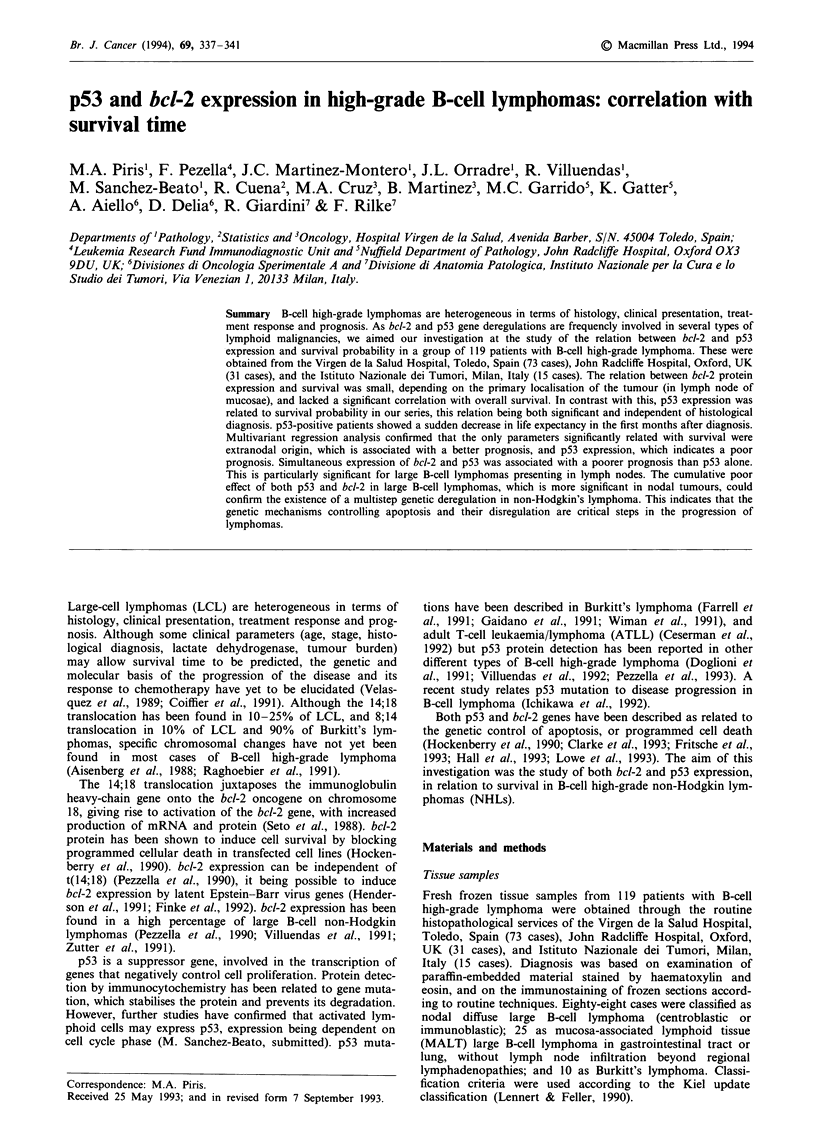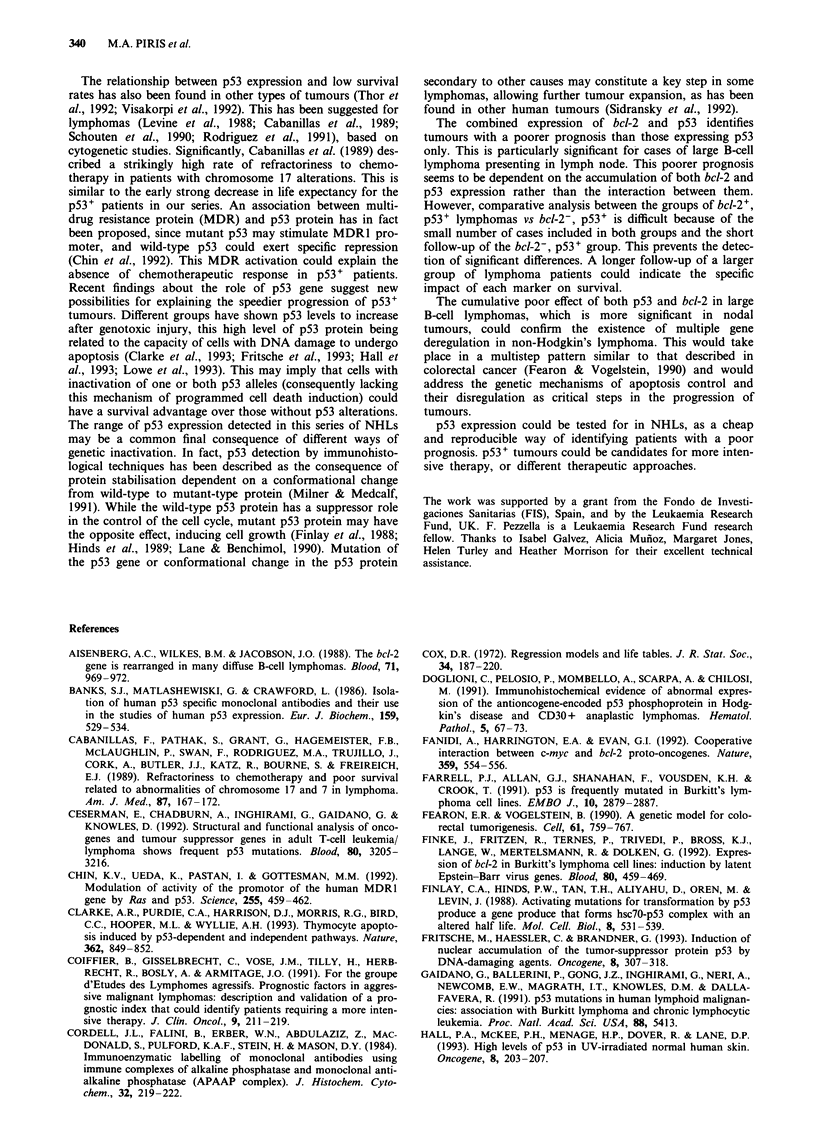Abstract
B-cell high-grade lymphomas are heterogeneous in terms of histology, clinical presentation, treatment response and prognosis. As bcl-2 and p53 gene deregulations are frequently involved in several types of lymphoid malignancies, we aimed our investigation at the study of the relation between bcl-2 and p53 expression and survival probability in a group of 119 patients with B-cell high-grade lymphoma. These were obtained from the Virgen de la Salud Hospital, Toledo, Spain (73 cases), John Radcliffe Hospital, Oxford, UK (31 cases), and the Istituto Nazionale dei Tumori, Milan, Italy (15 cases). The relation between bcl-2 protein expression and survival was small, depending on the primary localisation of the tumour (in lymph node of mucosae), and lacked a significant correlation with overall survival. In contrast with this, p53 expression was related to survival probability in our series, this relation being both significant and independent of histological diagnosis. p53-positive patients showed a sudden decrease in life expectancy in the first months after diagnosis. Multivariant regression analysis confirmed that the only parameters significantly related with survival were extranodal origin, which is associated with a better prognosis, and p53 expression, which indicates a poor prognosis. Simultaneous expression of bcl-2 and p53 was associated with a poorer prognosis than p53 alone. This is particularly significant for large B-cell lymphomas presenting in lymph nodes. The cumulative poor effect of both p53 and bcl-2 in large B-cell lymphomas, which is more significant in nodal tumours, could confirm the existence of a multistep genetic deregulation in non-Hodgkin's lymphoma. This indicates that the genetic mechanisms controlling apoptosis and their disregulation are critical steps in the progression of lymphomas.
Full text
PDF




Selected References
These references are in PubMed. This may not be the complete list of references from this article.
- Aisenberg A. C., Wilkes B. M., Jacobson J. O. The bcl-2 gene is rearranged in many diffuse B-cell lymphomas. Blood. 1988 Apr;71(4):969–972. [PubMed] [Google Scholar]
- Banks L., Matlashewski G., Crawford L. Isolation of human-p53-specific monoclonal antibodies and their use in the studies of human p53 expression. Eur J Biochem. 1986 Sep 15;159(3):529–534. doi: 10.1111/j.1432-1033.1986.tb09919.x. [DOI] [PubMed] [Google Scholar]
- Cabanillas F., Pathak S., Grant G., Hagemeister F. B., McLaughlin P., Swan F., Rodriguez M. A., Trujillo J., Cork A., Butler J. J. Refractoriness to chemotherapy and poor survival related to abnormalities of chromosomes 17 and 7 in lymphoma. Am J Med. 1989 Aug;87(2):167–172. doi: 10.1016/s0002-9343(89)80692-8. [DOI] [PubMed] [Google Scholar]
- Cesarman E., Chadburn A., Inghirami G., Gaidano G., Knowles D. M. Structural and functional analysis of oncogenes and tumor suppressor genes in adult T-cell leukemia/lymphoma shows frequent p53 mutations. Blood. 1992 Dec 15;80(12):3205–3216. [PubMed] [Google Scholar]
- Chin K. V., Ueda K., Pastan I., Gottesman M. M. Modulation of activity of the promoter of the human MDR1 gene by Ras and p53. Science. 1992 Jan 24;255(5043):459–462. doi: 10.1126/science.1346476. [DOI] [PubMed] [Google Scholar]
- Clarke A. R., Purdie C. A., Harrison D. J., Morris R. G., Bird C. C., Hooper M. L., Wyllie A. H. Thymocyte apoptosis induced by p53-dependent and independent pathways. Nature. 1993 Apr 29;362(6423):849–852. doi: 10.1038/362849a0. [DOI] [PubMed] [Google Scholar]
- Coiffier B., Gisselbrecht C., Vose J. M., Tilly H., Herbrecht R., Bosly A., Armitage J. O. Prognostic factors in aggressive malignant lymphomas: description and validation of a prognostic index that could identify patients requiring a more intensive therapy. The Groupe d'Etudes des Lymphomes Agressifs. J Clin Oncol. 1991 Feb;9(2):211–219. doi: 10.1200/JCO.1991.9.2.211. [DOI] [PubMed] [Google Scholar]
- Cordell J. L., Falini B., Erber W. N., Ghosh A. K., Abdulaziz Z., MacDonald S., Pulford K. A., Stein H., Mason D. Y. Immunoenzymatic labeling of monoclonal antibodies using immune complexes of alkaline phosphatase and monoclonal anti-alkaline phosphatase (APAAP complexes). J Histochem Cytochem. 1984 Feb;32(2):219–229. doi: 10.1177/32.2.6198355. [DOI] [PubMed] [Google Scholar]
- Doglioni C., Pelosio P., Mombello A., Scarpa A., Chilosi M. Immunohistochemical evidence of abnormal expression of the antioncogene-encoded p53 phosphoprotein in Hodgkin's disease and CD30+ anaplastic lymphomas. Hematol Pathol. 1991;5(2):67–73. [PubMed] [Google Scholar]
- Fanidi A., Harrington E. A., Evan G. I. Cooperative interaction between c-myc and bcl-2 proto-oncogenes. Nature. 1992 Oct 8;359(6395):554–556. doi: 10.1038/359554a0. [DOI] [PubMed] [Google Scholar]
- Farrell P. J., Allan G. J., Shanahan F., Vousden K. H., Crook T. p53 is frequently mutated in Burkitt's lymphoma cell lines. EMBO J. 1991 Oct;10(10):2879–2887. doi: 10.1002/j.1460-2075.1991.tb07837.x. [DOI] [PMC free article] [PubMed] [Google Scholar]
- Fearon E. R., Vogelstein B. A genetic model for colorectal tumorigenesis. Cell. 1990 Jun 1;61(5):759–767. doi: 10.1016/0092-8674(90)90186-i. [DOI] [PubMed] [Google Scholar]
- Finke J., Fritzen R., Ternes P., Trivedi P., Bross K. J., Lange W., Mertelsmann R., Dölken G. Expression of bcl-2 in Burkitt's lymphoma cell lines: induction by latent Epstein-Barr virus genes. Blood. 1992 Jul 15;80(2):459–469. [PubMed] [Google Scholar]
- Finlay C. A., Hinds P. W., Tan T. H., Eliyahu D., Oren M., Levine A. J. Activating mutations for transformation by p53 produce a gene product that forms an hsc70-p53 complex with an altered half-life. Mol Cell Biol. 1988 Feb;8(2):531–539. doi: 10.1128/mcb.8.2.531. [DOI] [PMC free article] [PubMed] [Google Scholar]
- Fritsche M., Haessler C., Brandner G. Induction of nuclear accumulation of the tumor-suppressor protein p53 by DNA-damaging agents. Oncogene. 1993 Feb;8(2):307–318. [PubMed] [Google Scholar]
- Gaidano G., Ballerini P., Gong J. Z., Inghirami G., Neri A., Newcomb E. W., Magrath I. T., Knowles D. M., Dalla-Favera R. p53 mutations in human lymphoid malignancies: association with Burkitt lymphoma and chronic lymphocytic leukemia. Proc Natl Acad Sci U S A. 1991 Jun 15;88(12):5413–5417. doi: 10.1073/pnas.88.12.5413. [DOI] [PMC free article] [PubMed] [Google Scholar]
- Hall P. A., McKee P. H., Menage H. D., Dover R., Lane D. P. High levels of p53 protein in UV-irradiated normal human skin. Oncogene. 1993 Jan;8(1):203–207. [PubMed] [Google Scholar]
- Henderson S., Rowe M., Gregory C., Croom-Carter D., Wang F., Longnecker R., Kieff E., Rickinson A. Induction of bcl-2 expression by Epstein-Barr virus latent membrane protein 1 protects infected B cells from programmed cell death. Cell. 1991 Jun 28;65(7):1107–1115. doi: 10.1016/0092-8674(91)90007-l. [DOI] [PubMed] [Google Scholar]
- Hinds P., Finlay C., Levine A. J. Mutation is required to activate the p53 gene for cooperation with the ras oncogene and transformation. J Virol. 1989 Feb;63(2):739–746. doi: 10.1128/jvi.63.2.739-746.1989. [DOI] [PMC free article] [PubMed] [Google Scholar]
- Hockenbery D., Nuñez G., Milliman C., Schreiber R. D., Korsmeyer S. J. Bcl-2 is an inner mitochondrial membrane protein that blocks programmed cell death. Nature. 1990 Nov 22;348(6299):334–336. doi: 10.1038/348334a0. [DOI] [PubMed] [Google Scholar]
- Ichikawa A., Hotta T., Takagi N., Tsushita K., Kinoshita T., Nagai H., Murakami Y., Hayashi K., Saito H. Mutations of p53 gene and their relation to disease progression in B-cell lymphoma. Blood. 1992 May 15;79(10):2701–2707. [PubMed] [Google Scholar]
- Lane D. P., Benchimol S. p53: oncogene or anti-oncogene? Genes Dev. 1990 Jan;4(1):1–8. doi: 10.1101/gad.4.1.1. [DOI] [PubMed] [Google Scholar]
- Levine E. G., Arthur D. C., Frizzera G., Peterson B. A., Hurd D. D., Bloomfield C. D. Cytogenetic abnormalities predict clinical outcome in non-Hodgkin lymphoma. Ann Intern Med. 1988 Jan;108(1):14–20. doi: 10.7326/0003-4819-108-1-14. [DOI] [PubMed] [Google Scholar]
- Lowe S. W., Schmitt E. M., Smith S. W., Osborne B. A., Jacks T. p53 is required for radiation-induced apoptosis in mouse thymocytes. Nature. 1993 Apr 29;362(6423):847–849. doi: 10.1038/362847a0. [DOI] [PubMed] [Google Scholar]
- Milner J., Medcalf E. A. Cotranslation of activated mutant p53 with wild type drives the wild-type p53 protein into the mutant conformation. Cell. 1991 May 31;65(5):765–774. doi: 10.1016/0092-8674(91)90384-b. [DOI] [PubMed] [Google Scholar]
- Peto R., Roe F. J., Lee P. N., Levy L., Clack J. Cancer and ageing in mice and men. Br J Cancer. 1975 Oct;32(4):411–426. doi: 10.1038/bjc.1975.242. [DOI] [PMC free article] [PubMed] [Google Scholar]
- Pezzella F., Jones M., Ralfkiaer E., Ersbøll J., Gatter K. C., Mason D. Y. Evaluation of bcl-2 protein expression and 14;18 translocation as prognostic markers in follicular lymphoma. Br J Cancer. 1992 Jan;65(1):87–89. doi: 10.1038/bjc.1992.16. [DOI] [PMC free article] [PubMed] [Google Scholar]
- Pezzella F., Morrison H., Jones M., Gatter K. C., Lane D., Harris A. L., Mason D. Y. Immunohistochemical detection of p53 and bcl-2 proteins in non-Hodgkin's lymphoma. Histopathology. 1993 Jan;22(1):39–44. doi: 10.1111/j.1365-2559.1993.tb00067.x. [DOI] [PubMed] [Google Scholar]
- Pezzella F., Tse A. G., Cordell J. L., Pulford K. A., Gatter K. C., Mason D. Y. Expression of the bcl-2 oncogene protein is not specific for the 14;18 chromosomal translocation. Am J Pathol. 1990 Aug;137(2):225–232. [PMC free article] [PubMed] [Google Scholar]
- Raghoebier S., Kramer M. H., van Krieken J. H., de Jong D., Limpens J., Kluin-Nelemans J. C., van Ommen G. J., Kluin P. M. Essential differences in oncogene involvement between primary nodal and extranodal large cell lymphoma. Blood. 1991 Nov 15;78(10):2680–2685. [PubMed] [Google Scholar]
- Rodriguez M. A., Ford R. J., Goodacre A., Selvanayagam P., Cabanillas F., Deisseroth A. B. Chromosome 17- and p53 changes in lymphoma. Br J Haematol. 1991 Dec;79(4):575–582. doi: 10.1111/j.1365-2141.1991.tb08084.x. [DOI] [PubMed] [Google Scholar]
- Schouten H. C., Sanger W. G., Weisenburger D. D., Anderson J., Armitage J. O. Chromosomal abnormalities in untreated patients with non-Hodgkin's lymphoma: associations with histology, clinical characteristics, and treatment outcome. The Nebraska Lymphoma Study Group. Blood. 1990 May 1;75(9):1841–1847. [PubMed] [Google Scholar]
- Seto M., Jaeger U., Hockett R. D., Graninger W., Bennett S., Goldman P., Korsmeyer S. J. Alternative promoters and exons, somatic mutation and deregulation of the Bcl-2-Ig fusion gene in lymphoma. EMBO J. 1988 Jan;7(1):123–131. doi: 10.1002/j.1460-2075.1988.tb02791.x. [DOI] [PMC free article] [PubMed] [Google Scholar]
- Sidransky D., Mikkelsen T., Schwechheimer K., Rosenblum M. L., Cavanee W., Vogelstein B. Clonal expansion of p53 mutant cells is associated with brain tumour progression. Nature. 1992 Feb 27;355(6363):846–847. doi: 10.1038/355846a0. [DOI] [PubMed] [Google Scholar]
- Thor A. D., Moore DH I. I., Edgerton S. M., Kawasaki E. S., Reihsaus E., Lynch H. T., Marcus J. N., Schwartz L., Chen L. C., Mayall B. H. Accumulation of p53 tumor suppressor gene protein: an independent marker of prognosis in breast cancers. J Natl Cancer Inst. 1992 Jun 3;84(11):845–855. doi: 10.1093/jnci/84.11.845. [DOI] [PubMed] [Google Scholar]
- Velasquez W. S., Jagannath S., Tucker S. L., Fuller L. M., North L. B., Redman J. R., Swan F., Hagemeister F. B., McLaughlin P., Cabanillas F. Risk classification as the basis for clinical staging of diffuse large-cell lymphoma derived from 10-year survival data. Blood. 1989 Aug 1;74(2):551–557. [PubMed] [Google Scholar]
- Villuendas R., Piris M. A., Orradre J. L., Mollejo M., Algara P., Sanchez L., Martinez J. C., Martinez P. P53 protein expression in lymphomas and reactive lymphoid tissue. J Pathol. 1992 Mar;166(3):235–241. doi: 10.1002/path.1711660305. [DOI] [PubMed] [Google Scholar]
- Villuendas R., Piris M. A., Orradre J. L., Mollejo M., Rodriguez R., Morente M. Different bcl-2 protein expression in high-grade B-cell lymphomas derived from lymph node or mucosa-associated lymphoid tissue. Am J Pathol. 1991 Nov;139(5):989–993. [PMC free article] [PubMed] [Google Scholar]
- Visakorpi T., Kallioniemi O. P., Heikkinen A., Koivula T., Isola J. Small subgroup of aggressive, highly proliferative prostatic carcinomas defined by p53 accumulation. J Natl Cancer Inst. 1992 Jun 3;84(11):883–887. doi: 10.1093/jnci/84.11.883. [DOI] [PubMed] [Google Scholar]
- Wiman K. G., Magnusson K. P., Ramqvist T., Klein G. Mutant p53 detected in a majority of Burkitt lymphoma cell lines by monoclonal antibody PAb240. Oncogene. 1991 Sep;6(9):1633–1639. [PubMed] [Google Scholar]
- Yunis J. J., Mayer M. G., Arnesen M. A., Aeppli D. P., Oken M. M., Frizzera G. bcl-2 and other genomic alterations in the prognosis of large-cell lymphoma. N Engl J Med. 1989 Apr 20;320(16):1047–1054. doi: 10.1056/NEJM198904203201605. [DOI] [PubMed] [Google Scholar]
- Zutter M., Hockenbery D., Silverman G. A., Korsmeyer S. J. Immunolocalization of the Bcl-2 protein within hematopoietic neoplasms. Blood. 1991 Aug 15;78(4):1062–1068. [PubMed] [Google Scholar]


